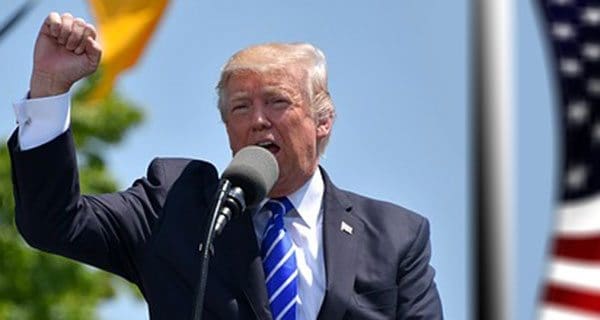 Right-wing extremists like to bray and screech about “political correctness.”
Right-wing extremists like to bray and screech about “political correctness.”
They think it’s a super big deal. U.S. President Donald Trump, in particularly, has been kvetching about “political correctness” for years.
Many years ago, I wrote in the National Post about how Stockwell Day, and those like him in the Canadian Alliance, were always going on (and on) about “political correctness.” The column is a bit ancient but I think it stands up.
In the main, I wrote, there were a couple reasons why this contingent were endlessly against political correctness:
Sometimes, it is done by intolerant people hoping to give a patina of respectability to their intolerance – to wit, ‘This may not be politically correct, but I think all refugees should be thrown in detention when they arrive here.’ And, sometimes, it is done by politicians to chill legitimate criticism of their views on issues like abortion, or sexual orientation, or something else.
Trump, as is now well-known, used the phrase “political correctness” as a cudgel on all his critics, over and over. He was a genius at it. He wielded that metaphorical cudgel to normalize his bigotry, to silence his critics, and to legitimize and mobilize other bigots. It worked like a charm.
Throughout the presidential campaign, however, I told my wife – about a thousand times, as we toiled as volunteers for Hillary Clinton – that Trump’s words would come back to haunt him, in the unlikely event that he became president of the United States. His hateful words – about Muslims, women, blacks, Mexicans, the disabled and myriad others – could be used against him in litigation, I told her.
“You’ve said that about a thousand times,” she’d say, which was true. “But how can political rhetoric, even his, be considered admissible in a court of law?”
Because, I replied, it’s relevant. It has probative value, as we lawyers like to say.
In the U.S., you often find this sort of non-legal stuff in something called a Brandeis Brief. It takes its name from Supreme Court Justice Louis Brandeis who, in 1908, before his elevation to America’s highest court, made a legal submission that was literally two percent legal argument and 98 percent data, social science, reports and near-anecdotal material.
In the Commonwealth, we have long done likewise. Here, for example, we have permitted judges to consider what is called “legislative intent” when a statute’s words aren’t as clear as they’d like. So judges will often read up on rough-and-tumble debates in the House of Commons, to discern Parliament’s intention. It’s messy but it works.
And, in the Charter of Rights and Freedoms era, Canadian judges have often gone even farther. Non-sworn, extrinsic evidence has been accepted in Canadian courts for decades. As no less than former Chief Justice Bora Laskin put it, this sort of material “may be considered by the court in determining whether the legislation rests on a valid constitutional base.”
That’s a rather genteel way of summarizing the constitutional dilemma Trump has created for himself. By being, you know, politically incorrect. What he said outside the courtroom is now being used to hammer him inside the courtroom. And it’s simply wonderful.
Here’s the Washington Post, explaining why Trumps words are coming back to haunt him – and why his Muslim ban is being found discriminatory, and therefore unconstitutional, by court after court.
Throughout Donald Trump’s campaign and now into the first weeks of his presidency, critics suggested that he cool his incendiary rhetoric, that his words matter. His defenders responded that, as Corey Lewandowski said, he was being taken too “literally.” Some, like Vice-President Pence, wrote it off to his “colourful style.” Trump himself recently explained that his rhetoric about Muslims is popular, winning him “standing ovations.”
No one apparently gave him anything like a Miranda warning: Anything he says can and will be used against him in a court of law.
And that’s exactly what’s happening now in the epic court battle over his travel ban, currently blocked by a temporary order set for argument Tuesday before a three-judge panel of the U.S. Court of Appeals for the 9th Circuit.
The states of Washington and Minnesota, which sued to block Trump’s order, are citing the president’s inflammatory rhetoric as evidence that the government’s claims — it’s not a ban and not aimed at Muslims — are shams.
In court papers, Washington and Minnesota’s attorneys general have pulled out quotes from speeches, news conferences and interviews as evidence that an executive order the administration argues is neutral was really motivated by animus toward Muslims and a “desire to harm a particular group.”
Get it, Donald? Being politically incorrect may have transformed you into a politician who was seen as unconventional. But it has likely rendered you unconstitutional, too. Your words are being used against you, and properly so.
There are three lessons here for politicians – almost always conservative – who want to throw off the oppressive bonds of political correctness and say whatever pops into their craniums. Heed them well.
- Words matter.
- You are always, always on the record.
- “No comment” is sometimes a really good idea.
It’s like what no less than the Prophet Muhammad said, some 1,400 years ago: “Say good or remain silent.”
Trump – who had the right to remain silent but didn’t – may soon wish he had followed the prophet’s advice.
(Not that he’d let the prophet into America to be heard by anyone, of course.)
Warren Kinsella is a Canadian journalist, political adviser and commentator.
Warren is a Troy Media contributor. Why aren’t you?
The views, opinions and positions expressed by columnists and contributors are the author’s alone. They do not inherently or expressly reflect the views, opinions and/or positions of our publication.


